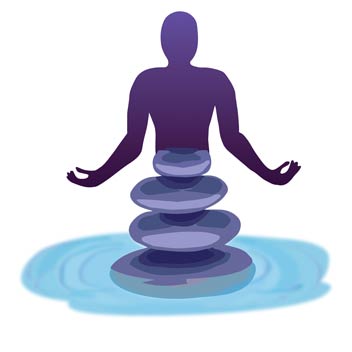Caring for the busy mind
Mindfulness meditation teaches the brain to take a break

Most of us spend our days lost in thought: thinking, planning, worrying, and generally churning a stream of ideas around and around. But most of life happens regardless of our thought process, and interrupting this cycle of inner thought lets a tired mind take a break. Mindfulness meditation teaches us how to take that break.
Although meditation may conjure mental images of ancient yogis perched on mountaintops, meditation is not limited to the already enlightened. Mindfulness meditation, the practice of increasing awareness, is simple, easy-to-learn, and accessible. It’s not just about breathing, or sitting stone still, getting rid of negative thoughts, or finding total peace in your psyche – mindfulness meditation asks for acceptance, and the rest comes after.
Recently, interest in mindfulness meditation has sprouted up from its promising benefits for mental and physical health. Relaxation, decreased sickness and chronic illness, and increased gray matter are all side effects of an ongoing mindfulness practice. TIME magazine devoted their November 2012 cover to a story covering the heart health benefits of meditation.
But striving for benefits is exactly the kind of behavior that mindfulness meditation attempts to direct us away from. Accepting the current situation is what mindfulness meditation is really all about.
Lisa Cappelli is a nursing instructor at Madison College. In addition to nursing, she also teaches mindfulness at Shambhala Meditation Center of Madison. For the past 12 years, she has studied Shambhala Buddhism, which is a branch of Tibetan Buddhism.
“Meditation helps you to discover what you already have,” said Cappelli, “which is peace of mind and clarity. And also the idea that everything in your life is workable.”
The Shambhala Meditation Center is open to the public and holds classes, workshops, and weekly gatherings around Shambhala teachings. Workshop topics include, “Contentment in Everyday Life,” “The Art of Being Human, “Unconditional Confidence,” and “Meditation in Everyday Life.” Learning in a group can make a subject more accessible to people, and Shambhala Meditation Center offers a comfortable environment.
First-time meditators can get instruction during open sitting hours. Instruction involves being guided into a meditative state, by drawing attention to the breath. Sitting in a comfortable position, either on the ground, a cushion or a chair, asks the mind to focus on the present moment and give it an anchor to ground to.
Every Thursday, the center holds Dharma Gatherings – an opportunity for meditation-minded individuals to come together, sit and talk. The weekly gatherings draw a robust group, a variety of age ranges and personal stories.
“We have a ton of young people. Our center is at a point where we actually have a lot of people under 30,” said Cappelli. Mediation isn’t for a specific religion or group of people either. It can be practiced alone or alongside Judaism, Islam, Hinduism, Christianity or any other ideology.
“What I was attracted to about Shambhala is that it’s secular Buddhism,” said Cappelli, “So there is this idea of everyday-life sort of Buddhism. It’s lessons, practices and strategies for actually living in everyday-life.”
Visiting the center provides first-hand experience into the peaceful realm of Shambhala Buddhism. Justin Lemke frequents the center as part of his meditation practice. He spent nine months in India and spent part of the time in a silent meditation retreat. The experience changed his life. After suffering from intense headaches, meditation was able to provide relief.
“I don’t have migraines anymore,” Lemke said.
Busy students are prime candidates to try meditation. Over time, mindfulness brings greater mental clarity. Wouldn’t it be nice to retain class lectures better because it’s easier to pay attention while the instructor speaks? The body needs exercise to stay fit and flexible, and the same rings true for the mind.
“Meditation is taking care of your mind,” said Cappelli. “It really does help you to be healthy.”
For more information on the Shambhala way, and workshops, classes, and weekly gatherings visit madison.shambhala.org.

























